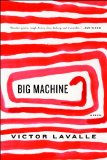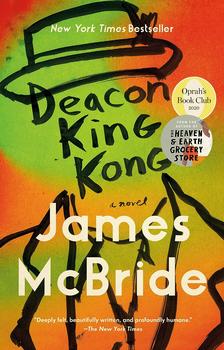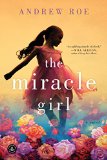Summary | Excerpt | Reviews | Beyond the book | Read-Alikes | Genres & Themes | Author Bio

Critics' Opinion:
Readers' Opinion:
First Published:
Aug 2009, 384 pages
Paperback:
Mar 2010, 384 pages
 Book Reviewed by:
Book Reviewed by:
Marnie Colton
Buy This Book
In 1966, singer-songwriter Leonard Cohen published his influential underground novel Beautiful Losers. About ten years later, Bob Seger recorded an album and song of the same title, minus the "s" at the end. Although I’ve never read Cohen’s book and never particularly cared for Seger’s music, I found that phrase running through my head as I read Big Machine, a novel that plunks down a group of ex-cons and drug addicts (or "Unlikely Scholars," as they are known in their new realm) at an occultist institution called the Washburn Library in a remote part of Vermont. Each Scholar has been mysteriously summoned by a note that claims to have knowledge of his or her deepest secret, and each note includes a one-way bus ticket to Burlington. For Ricky Rice, a janitor trying to quietly scrape by and stay off heroin, this odd missive comes as the ultimate second chance in a lifetime of second chances, and creates an immediate hook that snares us into Victor LaValle’s potent exploration of spirituality and redemption.
While Big Machine contains encounters with the sorts of angels and demons that skeptical readers might think belong more in a Dan Brown thriller than a literary novel, these supernatural elements expertly rub shoulders with realistic depictions of childhood fears, drug addiction, and the ramifications of religious faith. Indeed, the extraordinary and the ordinary intertwine so successfully that it’s impossible to imagine the book stripped of either; this isn’t a realist novel overlaid with the paranormal, nor is it a fantasy that occasionally interjects glimpses of reality. Anchoring all these big subjects is the voice of Ricky, a tough, honest, funny, and likeable narrator who has made many mistakes in his life but in whom readers can trust and become fully invested.
One of the best examples of Ricky’s complexity comes early in the book, as he’s embarking on his journey from upstate New York to Vermont by bus. In the midst of a blizzard, one proselytizing passenger starts ranting to his captive audience about sin and salvation, faith and belief. Understandably irritated, the driver throws him off, and the passengers, Ricky included, applaud. But before he disappears into the snow, the man makes a damning pronouncement on humanity: "We even worse than animals. We like monsters." Chastened, Ricky spends the rest of the trip wrestling with his embarrassment, only finding relief when all the passengers who had been onboard during the incident have disembarked: "I can’t say I felt any less guilty, but there was no one left to remind me of my shame. This wasn’t a resolution, but it was a relief." For a character to convincingly go through the stages of anger, collusion, guilt, and resignation regarding such a small yet ultimately important episode bodes well for his ability to grow and change throughout a novel. Ricky seldom stands still, either physically or psychologically; he is constantly dragging his ailing body (he has serious knee problems as a result of a previous mishap) from one adventure to another, while his sharp perceptions ensure that he vigilantly evaluates and comments on each new situation that arises.
Prophetically, the homeless man who had terrorized the bus passengers has a doppelganger named Solomon Clay, a righteously disgruntled Unlikely Scholar who leads a ragtag army of dissidents in a battle against the citizens of a California town where Ricky travels on a mission for the Library. The stakes for good and evil are high: Clay proves to be a charismatic cult leader for the dispossessed as well as a bomb-planting terrorist, while Ricky and his co-Scholar, Adele Henry (a former prostitute) are small (literally - both have slight physiques), fallible, and wracked with doubts about their mission.
LaValle carefully reconstructs Ricky’s past so that we understand just how fallible he is. In addition to revealing details about his former drug addiction, Ricky also tells two remarkable stories in a series of chapters that alternate with his present goings-on. The first involves his childhood membership in a cult called the Washerwomen, while the second depicts his nightmarish ordeal in a basement after a drug deal gone wrong. Both stories display immense imagination, a deep sense of sorrow, and a knack for presenting unexplained events in a way that neither cheapens their mystery nor places them beyond the realm of our understanding. For instance, in describing the Washerwomen, a trio of sisters who have fled Florida after killing their families, Ricky shows us another side of these women, a side that allows them to make sugar bread for the cult children and tell them new takes on traditional Bible stories. A side that allows one, Rose, to even prize doubt, usually the bane of religious faith, when she says, "Doubt is the big machine. It grinds up the delusions of women and men."
By the novel’s end, many delusions have been ground up, but the fundamental magnitude of love tempers these losses. When Ricky first arrives at the Washburn Library, he meets a fellow scholar named Violet who takes a liking to him and nudges him toward a relationship. Without divulging his reasons, either to Violet or to us, Ricky backs away. His eventual revelation that every woman he has ever tried to father a child with has endured a miscarriage is one of the many sad truths at the heart of the book; it also presages a mysterious event that will occur when he journeys into an elaborate sewer system with Adele, where he first comes across the Spirits that may or may not do the work of the Voice. Such masterly use of foreshadowing throughout Big Machine generates suspense while also allowing us to surrender to a storyteller whose gifts for both character and plot perfectly complement each other. LaValle acknowledges such horror/thriller icons as Stephen King, Shirley Jackson, and Ambrose Bierce as influences, but he brings a unique sense of humor and compassion to a story that could have become either outlandish or maudlin in less capable hands.
 Victor LaValle was born February 3, 1972 and raised in the Flushing and Rosedale neighborhoods of Queens, New York. He has a degree in English from Cornell University, and received his M.F.A. in Fiction from Columbia University. He has been the Distinguished Visiting Writer at Mills College in Oakland, California and a Visiting Assistant Professor at Columbia University. Victor is the author of the short-story collection Slapboxing with Jesus and the novel The Ecstatic, a finalist for the PEN/Faulkner Award.
Victor LaValle was born February 3, 1972 and raised in the Flushing and Rosedale neighborhoods of Queens, New York. He has a degree in English from Cornell University, and received his M.F.A. in Fiction from Columbia University. He has been the Distinguished Visiting Writer at Mills College in Oakland, California and a Visiting Assistant Professor at Columbia University. Victor is the author of the short-story collection Slapboxing with Jesus and the novel The Ecstatic, a finalist for the PEN/Faulkner Award.
Photo credit: E. Raboteau
![]() This review was originally published in The BookBrowse Review in September 2009, and has been updated for the
March 2010 edition.
Click here to go to this issue.
This review was originally published in The BookBrowse Review in September 2009, and has been updated for the
March 2010 edition.
Click here to go to this issue.

If you liked Big Machine, try these:

by James McBride
Published 2021
From James McBride, author of the National Book Award-winning The Good Lord Bird, comes a wise and witty novel about what happens to the witnesses of a shooting.

by Andrew Roe
Published 2016
A multi-faceted, multi-voiced debut novel that is a personal and heartfelt-chronicling of a family in flux, trying to find their individual and collective way-and also tells a larger, cultural story.





The House on Biscayne Bay
by Chanel Cleeton
As death stalks a gothic mansion in Miami, the lives of two women intertwine as the past and present collide.

The Flower Sisters
by Michelle Collins Anderson
From the new Fannie Flagg of the Ozarks, a richly-woven story of family, forgiveness, and reinvention.

The Funeral Cryer by Wenyan Lu
Debut novelist Wenyan Lu brings us this witty yet profound story about one woman's midlife reawakening in contemporary rural China.
Your guide toexceptional books
BookBrowse seeks out and recommends the best in contemporary fiction and nonfiction—books that not only engage and entertain but also deepen our understanding of ourselves and the world around us.